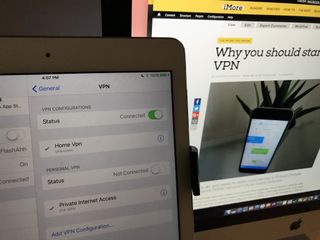How to prepare yourself for the depreciation of services on macOS Server

Apple is planning on changing the scope of it's macOS Server app to focus on the management of your network devices as opposed to offering hosting services such as HTTP, mail, calendar, VPN, DHCP, DNS and the like. As such, starting in the spring of 2018, Apple will depreciate these services and will eventually send them on the way of the Dodo leaving any macOS running Server without anymore Apple packaged updates.
- Why Apple is changing macOS Server
- Alternatives for contacts and calendars
- Alternatives for DNS, DHCP and HTTP
- Alternatives for mail and messaging
- Alternatives for VPN and netinstall
Cutting out the middle man
Apple is positioning this change as a way to cut out the middleman so to speak. All of the packages offered by Apple are from free and open source software (FOSS) and it claims that getting service packages directly from the maintainers allows administrators to get the best, most up-to-date, and secure versions available.
FOSS Calendar and Contact services
Apple is suggesting that administrators migrate to to the following for calendar and contact services.
DavMail
DavMail is an ambitious project trying to be a standard compliant replacement for Microsoft Exchange. It supports CalDav and CardDav and LDAP protocols for your calendaring and address books as well as mail protocols of POP, IMAP and SMTP.
Radicale
On the opposite spectrum is Radicale. It's only function is for calendaring and contacts. It prides itself on being a small and powerful implementation of the CalDAV and CardDAV protocols accessible also via HTTP. If all you require is calendaring and/or contact services, Radicale is for you.
Citadel
Akin to DavMail to provide a full experience for contact management and collaboration, Citadel provides many other features like email and messaging in it's suite on top of the built in calendaring and address book features. If you want a full featured service but not necessarily a Microsoft Exchange replacement, Citadel might fit the bill.
Another possible solution is the Calendar and Contacts Server.
Master your iPhone in minutes
iMore offers spot-on advice and guidance from our team of experts, with decades of Apple device experience to lean on. Learn more with iMore!
DNS, DHCP and HTTP
Many of the following programs may be familiar to you since administrators have had access to them under the macOS covers via terminal. The only difference is no GUI front end from the macOS Server app.
Kea
Kea is a standards compliant feature rich software for implementing DHCPv4 and DHCPv6.
Dnsmasq
Although the name implies it being a domain name server, Dnsmasq also provides a flexible DHCP service as well. So if you need a single program to provide both services, Dnsmasq can do that.
Apache HTTP Server
The venerable, powerful and highly scalable Apache HTTP server has had many years of development and hardening an still remains one of the best HTTP solutions available.
Other programs to provide these services: - FreeRADIUS - BIND - Unbound - Lighttpd
Mail and messaging
If you have requirements for mail and messaging specifically, Apple suggests some of the following solutions.
Courier
Courier takes a modular approach to your mail service needs with support for IMAP, SMTP, POP3, webmail and more. Can be configured as a relay or a straight server.
Postfix
Based loosely on the OG mail service Sendmail, Postfix is widely considered, the best email solution for mission critical projects.
Prosody IM
If email is not instant enough then Prosody IM may be what you are looking for. Prosody is an XMPP based instant messaging server so it allows for the use of many XMPP open standard clients.
More solutions for mail and messaging: - dovecot - ejabberd - Openfire
VPN and NetInstall
VPN services allow for secure connections between computers. NetInstall allows for diskless booting as well as writing images to disk.
OpenVPN
Probably the most used and documented FOSS VPN solution, OpenVPN is supported on nearly every internet facing device out there. For business or for home OpenVPN gives you protected and private transmission of data to and from your server and client.
NetSUS
If you need NetBoot or Net Install services the NetSUS can provide it for you.
Final thoughts
I really liked Apple's take on service administration. Use the powerful FOSS solutions under the covers whilst providing the ease of access for standard setups via a nice frontend. I'm saddened that macOS Server will no longer be a hub for network services. I'm happy that Apple is pointing administrators to the open source world for their depreciated services. But this leads me to one last thought. Why stop there? Why not simply go completely FOSS and use a GNU/Linux distribution that will NOT remove service functionality instead of sticking with macOS?
Will you be migrating your services whilst still running macOS? Let us know in the comments!
Most Popular





